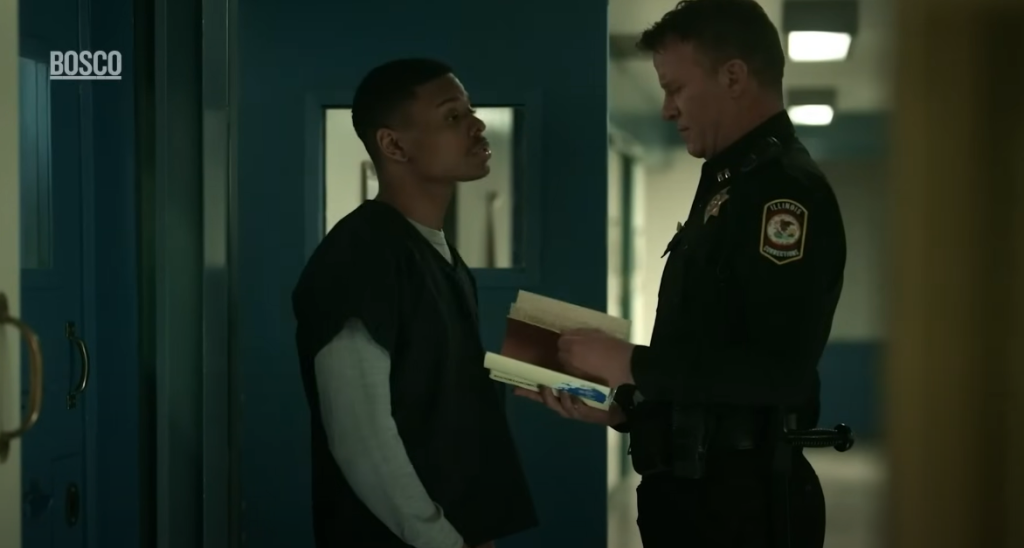

Nicholas Manuel Pino’s film “Bosco” emerges as a compelling addition to the prison drama genre, offering a fresh perspective that delves into profound themes such as guilt, familial relationships, and the quest for freedom. Through the central character of Bosco, brilliantly portrayed by Aubrey Joseph, the audience is taken on an emotional journey that challenges conventional narratives surrounding incarceration.
Pino’s storytelling approach is distinctive, weaving a rich tapestry of emotions and experiences that deeply resonate with viewers. By delving into Bosco’s inner turmoil and intricate family dynamics, the film transcends clichés, presenting a nuanced exploration of the human condition within the prison environment.

At the core of “Bosco” lies Aubrey Joseph’s remarkable performance, which infuses the character with depth and authenticity. Joseph skillfully portrays Bosco’s internal struggles and external challenges, captivating audiences with his portrayal of a complex individual grappling with remorse and redemption.
Overall, “Bosco” distinguishes itself as a thought-provoking examination of life behind bars, shedding light on the profound impact of guilt and the enduring pursuit of redemption. Through Pino’s direction and Joseph’s compelling performance, the film leaves a lasting impression, urging audiences to confront their assumptions and empathize with the complexities of the human experience.

“Bosco” breaks away from conventional prison drama tropes by subverting some while incorporating others. Unlike typical protagonists in this genre, Bosco is not unjustly imprisoned; he grapples with the weight of his own guilt, adding layers of complexity to his character. Throughout the narrative, Bosco confronts the harsh realities of incarceration, including mistreatment from both inmates and guards.
However, rather than solely portraying him as a victim, the film delves into Bosco’s internal struggles and his complicated past. Despite his guilt, Bosco forms meaningful connections within the prison walls, offering glimpses of vulnerability and redemption amidst the harsh environment. The film also explores his attempts to escape, highlighting his desperation and determination.

Throughout the film, Bosco’s voiceover provides insight into his suffering, revealing glimpses of his troubled upbringing and the influences that led him to a life of crime. The narrative carefully examines the emotional manipulation and coercion Bosco experienced, adding depth to his character and motivations.
The visual palette of “Bosco,” dominated by shades of green, contributes to its atmospheric portrayal of despair and decay. The recurring motif mirrors Bosco’s internal turmoil and underscores the lingering consequences of his actions, adding to the film’s emotional depth.

Aubrey Joseph’s performance as Bosco is both compelling and authentic, prompting speculation about the actor’s personal experiences. His portrayal of suffering and redemption is nuanced and mature, elevating the film to a higher level of emotional resonance.
The film’s modest budget proves advantageous, as it refrains from gratuitous displays of violence, focusing instead on the characters’ emotional journeys. This restraint underscores the injustice within the prison system, highlighting the systemic issues at play.

In conclusion, “Bosco” offers a poignant exploration of guilt, redemption, and the quest for freedom within the confines of prison life. Through its compelling narrative and authentic performances, the film challenges audiences to confront their assumptions and empathize with the complexities of the human experience.
| Aspect | Summary |
|---|---|
| Title | “Bosco” |
| Director | Nicholas Manuel Pino |
| Lead Actor | Aubrey Joseph |
| Themes | Guilt, familial relationships, freedom |
| Approach to Storytelling | Distinct, weaving emotions and experiences, nuanced examination of the human condition |
| Bosco’s Character | Guilty protagonist, complex narrative, struggles with past actions and choices |
| Performance | Aubrey Joseph’s remarkable portrayal, powerful and nuanced, captures inner struggles and external challenges |
| Prison Environment | Harsh realities, mistreatment, bullying, internal struggle, connections with inmates |
| Bosco’s Background | Troubling upbringing, morally dubious father, drawn into a life of crime |
| Visuals | Dominated by shades of green, evokes melancholy, mirrors internal turmoil |
| Portrayal of Pain | Constant companion, authentic portrayal by Aubrey Joseph |
| Violence | Deliberate restraint, one explicit instance of brutality |
| Despair and Hopelessness | Shattered family dynamic, generational strife, unrelenting tension and uncertainty |
| Stereotypes | Depicts harsh realities, draws from lived experiences |
| Moments of Joy | Few and far between, contrast with grim existence, fleeting sense of lightness |
| Yearning for Normalcy | Longing for freedom and simple pleasures, poignant motif |






